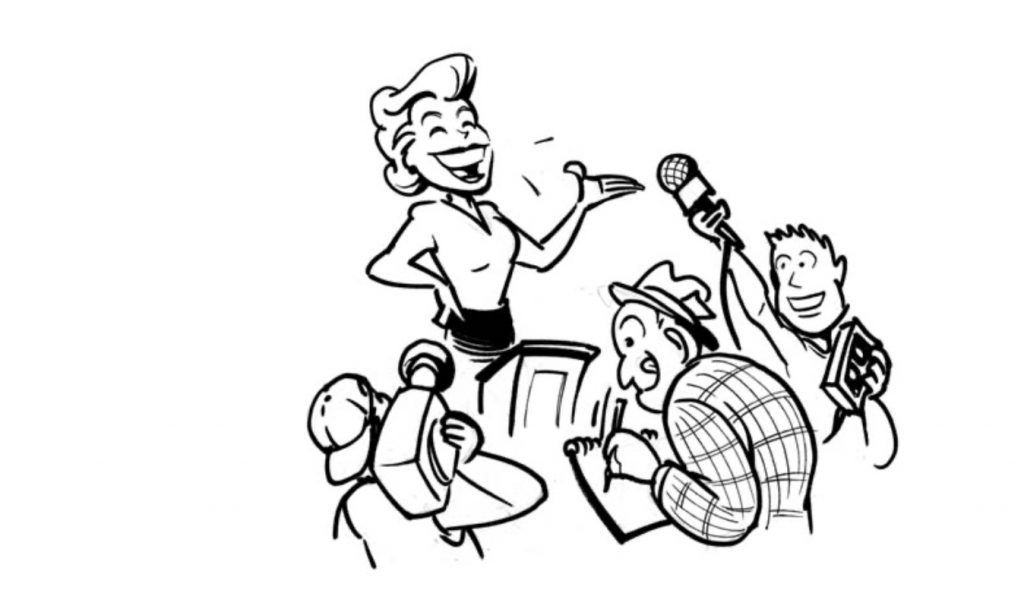TALKING THE TALK
Every once in a while, reporters run into someone who has a silver tongue, a person whose every sentence is a ready-to-print quote. But these folks are rare. Most of the time, a good quote is a happy accident. It doesn’t have to be that way.
You, too, can become what’s known in our profession as a sound bite machine. In this chapter, I’ll help you master the art of the seven-second sound bite. You don’t have to run out and buy a stopwatch. There’s no magic to my seven-second rule. I just know after twenty years of putting together television pieces, that the best quotes are those pithy little sentences that seem to sum everything up. In fact, bells go off in my ears whenever someone delivers one. We may interview you for an hour on tape, but all we’re really interested in are those seven-second gems. Honestly, as soon as I hear one, I say to myself, “No more calls, we have a winner!”
FREEZING TIME
I’ll give you an example. I was reporting on cryonics hoping to answer the question “Why would anyone want to get frozen at the moment of death, when you have no way of knowing whether science will ever be able to bring you back?”
My feature focused on Jim Halperin of Dallas. In addition to owning Heritage Rare Coin Galleries, the world’s largest rare coin company, Halperin is the author of several books, including The First Immortal, a critically-acclaimed novel on the subject of cryonics. It was while doing research for his book that Halperin became convinced that cryonics is possible, so he signed up for it himself.
Now, you should understand that Halperin is a very logical businessman. He makes critical decision on the value of coins, often involving a small fortune, everyday. So why would such a man sign up for a service that offers no guarantees? “Well, I figure it’s a lot better odds than letting the worms eat me,” Halperin told me on camera.
Wow! What a sound bite! He summed up all his knowledge on the subject in one punchy little sentence. He could have said, “Cryonics isn’t as final as being buried.” But that wouldn’t have had nearly the impact. As far as I know Halperin has never been coached in the art of delivering quotes. He’s just a natural. But there’s no reason you can’t become a sound bite machine too.
DARE TO PREPARE
It’s amazing how many people beg me to do a story about them, yet have never given a moments thought to what they might say once the camera starts rolling. Believe it or not, most reporters don’t have a hidden agenda. We’re not trying to twist your words or make you say something you don’t want to say. All we are trying to do is tell the story while being both informative and entertaining. You can help us by preparing for the interview. What are the points you’d like to make? What questions
do your friends ask you about the subject? If you give the inter-view enough thought, you won’t be surprised by anything the reporter asks.
In fact, if you’ve crafted some great quotes beforehand, you can always answer a difficult question the way many politicians do: “That’s an excellent question, and it reminds me of another point I’d like to make.” Then you change the subject and deliver answers to the questions you’ve already thought about.
PUTTING SOME TEETH INTO YOUR SOUND BITES
The best sound bites are rarely informational. They serve only one purpose: to add flavor to the story. In other words, the reporter prepares the meal, and you add the spice.
Just think about the memorable quotes from political debates over the years. We remember Walter Mondale asking “Where’s the beef?” We remember Ronald Reagan saying, “There you go again.” And we remember Lloyd Bentson scold-ing Dan Quayle, “I knew Jack Kennedy. Jack Kennedy was a friend of mine. You’re no Jack Kennedy.”
None of those quotes are very informative. They are just zingers. And don’t think for one moment those quotes were ad-libs. Each candidate’s writers and coaches carefully crafted them. You don’t have to be Walt Whitman, or even Walt Mondale, to come up with some great quotes of your own.
HERE’S HOW
Some of the best sound bites I’ve ever heard are analogies—parables, if you will—to prove a point. For instance, I interviewed a woman about her pothole problem. For years, the city had failed to fix the craters in front of her house. And when she learned that the city was about to spend $70 million on an extravagant bridge, she said on camera, “It’s like having a run-down house and buying new furniture.” Boy, did the bells go off in my head when she delivered that little beauty! I didn’t need to ask her anything else. End of interview. She couldn’t have summed up her feelings any better if she had talked for days. It was the perfect seven-second soundbite.
CLEVER ENDEAVOR
If you’re clever, you can turn an otherwise boring statement into a great sound bite. Mondale could have said, “There’s no substance.” Instead, he played off a popular Wendy’s commercial that was running at the time and his “Where’s the beef?” remark became one of the most memorable quotes of his campaign. Quotes drawn from pop culture make great sound bites, and there’s no debating that.
Use colorful and descriptive words. Jim Halperin’s “better odds than letting the worms eat me” was a pretty vivid way of describing what happens when you’re six-feet under. Maybe being frozen wouldn’t be that bad, after all.
Don’t be afraid to use slang for effect. Baseball legend Yogi Berra may be best known for having said, “It ain’t over till it’s over.” No, it wasn’t proper grammar. But something tells me he wouldn’t have become the icon he is, if he didn’t take some liberties with his language. And there ain’t nothing wrong with that!
EXAMPLES
Don’t say: “I hope the Yankees win.”
Say: “The Yankees will beat the Dodgers like a short-order cook beats eggs.”
Don’t say: For a while I struggled to build my business.
Say: “When I first started, I was so broke I used to go to weddings just for the rice!”
Don’t say: “It’s just about over.”
Say: “The fat lady ain’t singing yet, but I can hear her clearing her throat.”
Got the idea? If you dare to prepare, you can come up with a clever way of saying just about anything. And trust me, if your quote is well-crafted, it’ll be the one the media uses.
WATCH THE JARGON
Doctors have a really tough time with this. They say, “lacerations and contusions” when they should say, “cuts and bruises.” Never forget your audience. Most people you reach through the media didn’t go to medical school. You can be authoritative and still be conversational. Avoid technical words, and replace them with words that even someone who knows nothing about your subject will understand.
The same goes for numbers and statistics. Numbers are fine and they have their place, but most will be lost on people unless they can see them. If the figure is 52 percent, say “a little more than half.” And it’s even better when you can make the number relevant to someone’s life. If you’re criticizing a government project as being too expensive, don’t say $10 million. Say: “We could buy 15 million hot lunches for needy school children with the money we’re spending on this lame project.”
NEWS YOU CAN USE
- Great sound bites aren’t happy accidents. Just ask Mondale’s speechwriter.
- Use analogies to make your point. “Old house, new furniture” is just a better way of saying “bad roads, new bridge.”
- Use colorful language. “Worms eating you” is much better’ than just saying “buried.”
- Slang is fine when it’s clear you are using it on purpose. It can make you seem more conversational and folksy.
- Avoid technical talk. Everyone at your office may understand you, but Joe six-pack on the couch won’t have a clue.

